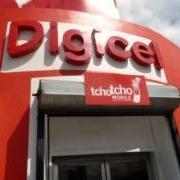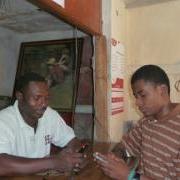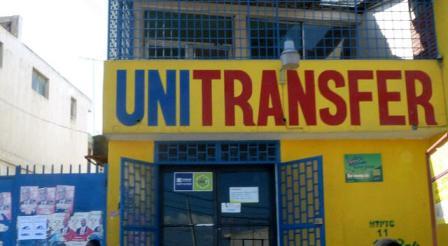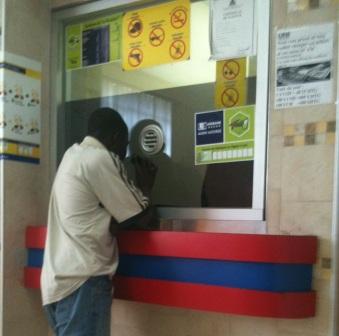Not all agents are created equal
Not all agents are created equal
- March 14, 2011
The uptake and success of mobile money in Haiti will be affected by user experience at mobile money agents. While users should have similar experiences wherever they choose to use mobile money, we have found that their experiences vary depending upon what kind of agent they use. The centrality of the agent to the success of mobile money means that we cannot take the word “agent” for granted.

 Who is the mobile money agent? In Haiti, businesses providing a mobile money service
have a sign on the front of their shop identifying them as an “Agent Authorisé” (authorized
agent). The business has gone through the training provided by the mobile money operator
and is able to carry out the different transactions involved. However not all agents
are created equal. Our research has found several types of agents.
Who is the mobile money agent? In Haiti, businesses providing a mobile money service
have a sign on the front of their shop identifying them as an “Agent Authorisé” (authorized
agent). The business has gone through the training provided by the mobile money operator
and is able to carry out the different transactions involved. However not all agents
are created equal. Our research has found several types of agents.
In the ideal model, the small business owner is always the one who carries out the
mobile money transactions. Not only is the owner always present at their place of
business, but the commission represents an incentive for the business owner to promote
the service. This is the case of Andy, the owner of a cyber café. He is the most successful
among the agents that we have interviewed. Because he stands to gain from registering
new clients, Andy says that he tries to turn as many of his regular clients into mobile
money users as he can.
Unlike Andy who is the owner and representative, there are agents that are placed
into stores by another company, which has multiple outlets and places its agents in
different businesses. While these employees have an incentive to promote mobile money
because their employment status depends on the continuing success of mobile money,
the fact that they are not fully integrated in the businesses where they are placed
means lack of consistency in the provision of service. Cases when these agents are
absent and those in the store cannot tell the client when they will come back means
that one cannot always expect service at some locations even when they are the closest
to one’s house or place of business.
 Some mobile money agents are additions to already existing money transfer businesses.
Voila’s T-Cash outlets are currently located in UniTransfer offices. The placement
of the mobile money at the UniTransfer office is not without problems. Because there
is only one line for money transfers and mobile money, T-Cash customers face the same
amount of time waiting in line that existed prior to mobile money. Furthermore, mobile
banking customers are more likely to be robbed using transfer houses than other kinds
of businesses that are not associated with withdrawing cash. Long lines and the potential
security risk associated with walking out of a mobile money outlet will discourage
customers.
Some mobile money agents are additions to already existing money transfer businesses.
Voila’s T-Cash outlets are currently located in UniTransfer offices. The placement
of the mobile money at the UniTransfer office is not without problems. Because there
is only one line for money transfers and mobile money, T-Cash customers face the same
amount of time waiting in line that existed prior to mobile money. Furthermore, mobile
banking customers are more likely to be robbed using transfer houses than other kinds
of businesses that are not associated with withdrawing cash. Long lines and the potential
security risk associated with walking out of a mobile money outlet will discourage
customers.
The most common, yet problematic, “agent” scenario is the one where the business owner
decides to sign up for mobile money and designate just one of their existing employees
as the mobile money agent. For these employees, serving as the mobile money “agents”
is an addition to their schedule of duty and is not necessarily accompanied by an
increase in salary. Not only do these employees lack the incentives of business owners
but the fact that providing mobile money services is one of the many things they have
to do means that they may not have enough time to provide all the information a client
may need.
 Benjamin, a computer programmer at a cyber café represents one of those “agents” whose
work load was increased by the addition of mobile money service at his outlet. On
the one hand, he is one of the most enthusiastic agents we have met because he is
a true believer in the product and its promise. However, he is also a bit discouraged
because as he said: “I am working for the mobile money operator but I do not feel
that I am benefiting from them.” According to Benjamin, the agents are not the only
ones who suffer. Clients do not receive the kind of attention they deserve, especially
for a service that is so new and that involves their money. He explains, “When someone
comes and are about to give them their money you have to spend all the time they need
and answer all of their questions in order for them to trust you with their money.”
Given that the target of mobile money are unbanked people for whom every penny counts,
their ability to trust their agents is crucial to their adoption of mobile money.
If clients cannot count on their agents being there or the agent has to rush off to
serve other customers potential mobile money clients will think twice before adopting
mobile money.
Benjamin, a computer programmer at a cyber café represents one of those “agents” whose
work load was increased by the addition of mobile money service at his outlet. On
the one hand, he is one of the most enthusiastic agents we have met because he is
a true believer in the product and its promise. However, he is also a bit discouraged
because as he said: “I am working for the mobile money operator but I do not feel
that I am benefiting from them.” According to Benjamin, the agents are not the only
ones who suffer. Clients do not receive the kind of attention they deserve, especially
for a service that is so new and that involves their money. He explains, “When someone
comes and are about to give them their money you have to spend all the time they need
and answer all of their questions in order for them to trust you with their money.”
Given that the target of mobile money are unbanked people for whom every penny counts,
their ability to trust their agents is crucial to their adoption of mobile money.
If clients cannot count on their agents being there or the agent has to rush off to
serve other customers potential mobile money clients will think twice before adopting
mobile money.
As mobile money providers are looking to expand their agent networks in Haiti, they
need to be aware of the fact that while the businesses owners have an incentive to
become mobile money agents because of the commission and the added traffic that mobile
money brings, the way they set up service provision will affect customer experience
and return business.
--Espelencia Baptiste
--Photo #1: Digicel TchoTcho sign. Photo credit Espelencia Baptiste, 2011
--Photo #2: TchoTcho user and client. Photo credit Espelencia Baptiste, 2011
--Photo #3: Unitransfer T-Cash sign. Photo credit: Espelencia Baptiste, 2011
--Photo #4: T-Cash user. Erin B. Taylor, 2011
Share on:
Related News Items
- Campos-Rodríguez receives competitive UCLA research award
- Kai Wehmeier named Fulbright-Tocqueville Distinguished Chair
- Chernyak and Martinez-Aranda named as recipients of Dean's Awards for Outstanding Research
- The real history of the complex relationship between Chinese and Black Americans in the Mississippi Delta
- A world of insight


connect with us: